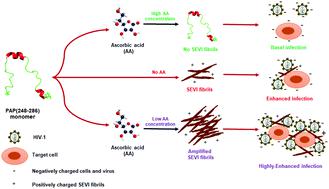当前位置:
X-MOL 学术
›
RSC Chem. Biol.
›
论文详情
Our official English website, www.x-mol.net, welcomes your feedback! (Note: you will need to create a separate account there.)
Dual concentration-dependent effect of ascorbic acid on PAP(248–286) amyloid formation and SEVI-mediated HIV infection
RSC Chemical Biology Pub Date : 2021-08-10 , DOI: 10.1039/d1cb00084e Satabdee Mohapatra 1 , Guru Krishna Kumar Viswanathan 1 , Lukas Wettstein 2 , Elad Arad 3 , Ashim Paul 1 , Vijay Kumar 1 , Raz Jelinek 3 , Jan Münch 2 , Daniel Segal 1
RSC Chemical Biology Pub Date : 2021-08-10 , DOI: 10.1039/d1cb00084e Satabdee Mohapatra 1 , Guru Krishna Kumar Viswanathan 1 , Lukas Wettstein 2 , Elad Arad 3 , Ashim Paul 1 , Vijay Kumar 1 , Raz Jelinek 3 , Jan Münch 2 , Daniel Segal 1
Affiliation

|
Human semen contains various amyloidogenic peptides derived from Prostatic Acid Phosphatase (PAP) and Semenogelin proteins that are capable of enhancing HIV-1 infection when assembled into fibrils. The best characterized among them is a 39 amino acid peptide PAP(248–286), which forms amyloid fibrils termed SEVI (semen-derived enhancer of viral infection) that increase the infectivity of HIV-1 by orders of magnitude. Inhibiting amyloid formation by PAP(248–286) may mitigate the sexual transmission of HIV-1. Several vitamins have been shown to reduce the aggregation of amyloids such as Aβ, α-Synuclein, and Tau, which are associated with neurodegenerative diseases. Since ascorbic acid (AA, vitamin C) is the most abundant vitamin in semen with average concentrations of 0.4 mM, we here examined how AA affects PAP(248–286) aggregation in vitro. Using ThT binding assays, transmission electron microscopy, and circular dichroism spectroscopy, a dual and concentration-dependent behavior of AA in modulating PAP(248–286) fibril formation was observed. We found that low molar ratios of AA:PAP(248–286) promoted whereas high molar ratios inhibited PAP(248–286) fibril formation. Accordingly, PAP(248–286) aggregated in the presence of low amounts of AA enhanced HIV-1 infection, whereas excess amounts of AA during aggregation reduced the infectivity enhancing effect in cell culture. Collectively, this work provides a biophysical insight into the effect of AA, an important seminal component, on SEVI fibrillation which might impact amyloid formation kinetics, thereby modulating the biological activity of semen amyloids.
中文翻译:

抗坏血酸对 PAP(248-286) 淀粉样蛋白形成和 SEVI 介导的 HIV 感染的双重浓度依赖性影响
人类精液含有多种源自前列腺酸性磷酸酶 (PAP) 和 Semenogelin 蛋白的淀粉样肽,这些蛋白在组装成原纤维时能够增强 HIV-1 感染。其中特征最好的是 39 个氨基酸的肽 PAP(248-286),它形成称为 SEVI(精液衍生的病毒感染增强剂)的淀粉样原纤维,可将 HIV-1 的感染性增加几个数量级。通过 PAP(248-286) 抑制淀粉样蛋白的形成可以减轻 HIV-1 的性传播。几种维生素已被证明可以减少淀粉样蛋白的聚集,例如与神经退行性疾病相关的 Aβ、α-突触核蛋白和 Tau。由于抗坏血酸(AA、维生素 C)是精液中含量最丰富的维生素,平均浓度为 0.4 mM,我们在这里研究了 AA 如何影响 PAP(248-286)聚集体外。使用 ThT 结合测定、透射电子显微镜和圆二色光谱,观察到 AA 在调节 PAP(248-286) 原纤维形成中的双重和浓度依赖性行为。我们发现 AA:PAP(248-286) 的低摩尔比促进了而高摩尔比抑制了 PAP(248-286) 原纤维的形成。因此,PAP(248-286) 在少量 AA 存在时聚集会增强 HIV-1 感染,而在聚集过程中过量的 AA 会降低细胞培养中的感染性增强作用。总的来说,这项工作提供了对 AA(一种重要的精液成分)对可能影响淀粉样蛋白形成动力学的 SEVI 纤维化的影响的生物物理学见解,从而调节精液淀粉样蛋白的生物活性。
更新日期:2021-08-16
中文翻译:

抗坏血酸对 PAP(248-286) 淀粉样蛋白形成和 SEVI 介导的 HIV 感染的双重浓度依赖性影响
人类精液含有多种源自前列腺酸性磷酸酶 (PAP) 和 Semenogelin 蛋白的淀粉样肽,这些蛋白在组装成原纤维时能够增强 HIV-1 感染。其中特征最好的是 39 个氨基酸的肽 PAP(248-286),它形成称为 SEVI(精液衍生的病毒感染增强剂)的淀粉样原纤维,可将 HIV-1 的感染性增加几个数量级。通过 PAP(248-286) 抑制淀粉样蛋白的形成可以减轻 HIV-1 的性传播。几种维生素已被证明可以减少淀粉样蛋白的聚集,例如与神经退行性疾病相关的 Aβ、α-突触核蛋白和 Tau。由于抗坏血酸(AA、维生素 C)是精液中含量最丰富的维生素,平均浓度为 0.4 mM,我们在这里研究了 AA 如何影响 PAP(248-286)聚集体外。使用 ThT 结合测定、透射电子显微镜和圆二色光谱,观察到 AA 在调节 PAP(248-286) 原纤维形成中的双重和浓度依赖性行为。我们发现 AA:PAP(248-286) 的低摩尔比促进了而高摩尔比抑制了 PAP(248-286) 原纤维的形成。因此,PAP(248-286) 在少量 AA 存在时聚集会增强 HIV-1 感染,而在聚集过程中过量的 AA 会降低细胞培养中的感染性增强作用。总的来说,这项工作提供了对 AA(一种重要的精液成分)对可能影响淀粉样蛋白形成动力学的 SEVI 纤维化的影响的生物物理学见解,从而调节精液淀粉样蛋白的生物活性。



























 京公网安备 11010802027423号
京公网安备 11010802027423号